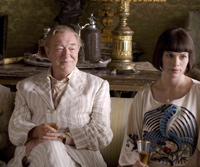Guilt, intrigue, lust, nobility, and religion: Brideshead Revisited has it all. To the casual observer, historical epics named for and set in expansive English estates might recall romantic dramas a la Jane Austen, but Brideshead‘s characters, living between the World Wars, are more concerned with sin, grace, and redemption than class and manners.
Adapted from Evelyn Waugh’s 1945 novel, the film tells the story of Charles Ryder (Matthew Goode), a young painter from a modest background studying history at Oxford. A chance meeting with Sebastian Flyte (Ben Whishaw)—a dandified aesthete of dubious sexuality—blossoms into friendship, and Charles gets an intoxicating glimpse into the lifestyle of the rich and privileged that will alter the course of his life.
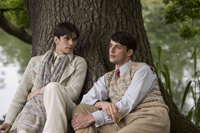
Sebastian and Charles spend much time eschewing study in favor of wasting time taking day trips around the countryside and holding raucous parties. After an idyllic picnic, Sebastian takes Charles to see the “place where his family lives”—the sumptuous estate of Brideshead Castle. Despite Sebastian’s best efforts to exclude his family from their friendship, Charles gradually makes their acquaintance: Lady Marchmain (Emma Thomson), the matriarch of the Flyte family whose religious devotion has taken a detour toward dour guilt-mongering, beloved and witty sister Julia (Hayley Atwell), comically earnest eldest brother Bridey, and devout little sister Cordelia. (As typical with the British aristocracy, the Lord and Lady are called by their title—Marquis of Marchmain—while the family name is Flyte.) But one factor confounds Charles, an avowed atheist, and distances him from the family: they are Catholic, and he is not. To Charles’ shock, even Sebastian and Julia—self-proclaimed “sinners”—do not reject their family’s religion, but only wish it were not true so they could do as they please.
Awestruck by the beauty and history of Brideshead, Charles wastes no time in leaving London during holiday for Brideshead when he receives a wheedling telegram from Sebastian following a minor accident. There he gains Lady Marchmain’s respect as a respectable young man, worthy of keeping an eye on her more volatile son. Sebastian and Charles spend the holiday in pastoral ecstasy, drinking too much wine, swimming in the fountains, and lounging about the estate, and as their friendship deepens, so does Sebastian’s attraction to Charles. That attraction leads to a languorous kiss after a wine-soaked afternoon, but Charles, not sure of his feelings, makes no comment, and the relationship grows awkward.
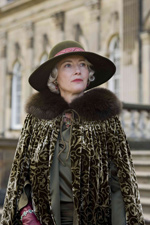
At Lady Marchmain’s request, Charles accompanies Sebastian and Julia on a trip to visit their father in Italy, where he meets Lord Marchmain (Michael Gambon), a former Catholic convert-turned-agnostic who left the family years before, driven away by his wife’s rigid and sometimes grim adherence to her religious duty. In Italy, Julia and Charles are unexpectedly drawn toward one another, and when Sebastian discovers their slowly igniting passion, his heart—and their friendship—is broken.
However, Charles’ attempt to win Julia’s heart is blocked by Lady Marchmain, who objects not to his social standing but to his lack of religious faith. Needing him to still watch over the rapidly degenerating Sebastian, she asks him to return to Brideshead for Julia’s birthday—and, as it turns out, engagement—party. There he finds that Sebastian has turned to an intense alcoholism to deal with his emotional pain. When Charles loans him money to win back his friendship, he is summarily dismissed from Brideshead and the Marchmains’ lives.
Years later, Charles is married and a successful artist. He returns from a two-year trip to the tropics to paint the wildlife and by chance encounters Julia, now married, on his ship from America to England. Their passion reignites and the two give in, spending many nights together. They decide to divorce their spouses and marry each other, but Julia continues to feel the prick of her conscience, and her faith comes to a crisis point when her father comes home to die.
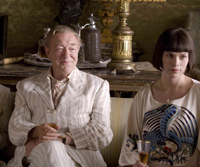
The diversity of these characters’ attitudes toward Catholicism is striking for its range, from the well-motivated but grim Lady Marchmain, who embraces truth and duty without any accompanying grace and love, to Lord Marchmain, who rejects religion during his lifetime but is not beyond God’s grace. Bridey is practical and traditional; Cordelia is cheerfully devoted; and Julia and Sebastian both recognize their sinful ways, but remain convinced of the truth of the church’s teachings on sin.
Portraying these types of complex characters always presents a challenge, but with this cast, one could hardly go wrong. Thompson is regal, imbuing the potentially one-dimensional Lady Marchmain with just the right mixture of emotion and frigidity; Gambon makes a perfect lovable rogue of Lord Marchmain. Goode and Atwell share excellent chemistry.
But it is Whishaw whose performance lights up the screen. Last seen as a narrative Bob Dylan in I’m Not There and a deeply disturbing murderer in Perfume, he disappears completely into Sebastian in all his playfulness, confusion, depression, and final peace. Whishaw is still a relatively new onscreen face, but a role like this augurs well for his staying power as a complex, accomplished actor.
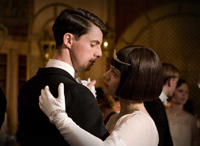
Considering the widespread appeal of last year’s acclaimed Atonement, it’s surprising that Miramax hasn’t chosen to push Brideshead Revisited toward a wider audience. The two films merit comparison. Both are epics that begin in post-World War I England, both are visually sumptuous and emotionally affecting, and both deal with themes of guilt, grace, and redemption.
But Brideshead is arguably the better movie. Whereas Atonement subtly tweaked the novel’s ending to alter its eponymous meaning, the liberties that Brideshead takes with its source material work as enhancements to what’s in the text. The nature of Charles and Sebastian’s relationship, apparent only when reading between the novel’s lines, is made more explicit for the film (though not played for sensational effect). Julia and Charles’ relationship—a storyline that does not surface until later in the book—is amplified to become a central plot point in this film. To fit the complex story into a feature-length movie, experienced screenwriters Andrew Davies (Bridget Jones’ Diary, Bleak House) and Jeremy Brock (The Last King of Scotland) play with the story to craft a compelling narrative and preserve the story’s main themes: sin, guilt, redemption, and grace.
A film like Brideshead polarizes its viewers, whose reaction to the characters’ choices, views, and the accompanying consequences depend on their own religious experiences. But Evelyn Waugh, the Catholic novelist who wrote the story on which the film is based, said the story “deals with what is theologically termed ‘the operation of Grace,’ that is to say, the unmerited and unilateral act of love by which God continually calls souls to Himself.” In one edition, he titled the third section of the novel “A Twitch Upon the Thread,” a term borrowed from G. K. Chesterton to describe God’s grace in bringing wayward sinners to repentance.
Though it’s generally considered to be a story of the disappearing tradition of aristocracy in the waning British Empire between the wars, Brideshead Revisited is, at its core, a tale of the outworking of God’s grace in people’s lives. Thankfully, this adaptation—with its sumptuous look, tightly crafted script, and exceptional cast—does justice to the story.
Talk About It
Discussion starters- Evelyn Waugh, the author of Brideshead Revisited, echoed G. K. Chesterton when he wrote of the “twitch upon the thread” that God performs to call a sinner toward repentance and grace. When do each of the main characters in Brideshead Revisited experience this “twitch”? Can you remember a time in your life when you felt God’s grace calling you toward repentance?
- Rex Mottram’s view of the family’s Catholicism is flippant and limited; he says that their faith is a wonderful one, because it allows one to sin and then gain forgiveness through confession. Have you ever caught yourself thinking this way about sin, faith, and forgiveness? What does Paul in Romans 6 say about this attitude?
- What do you make of Charles Ryder’s attitude toward Julia’s Catholicism at the end of the film? In the final scene, why does he act as he does in the chapel? What place do you believe doubt has in faith?
The Family Corner
For parents to considerBrideshead Revisited is rated PG-13 for some sexual content. The film maintains the novel’s overtones of homosexuality and adultery, including a kiss between two men and an adulterous (but relatively inexplicit) sex scene between Charles and Julia. There are also several shots of male rear nudity, and some drunkenness among college students.
Photos © Copyright Miramax
Copyright © 2008 Christianity Today. Click for reprint information.



